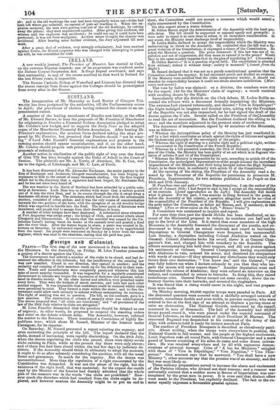SCOTLAND.
The inauguration of Mr. Macaulay as Lord Rector of Glasgow Uni- versity has been postponed by the authorities, till the Parliamentary recess in April; the prevalence of cholera having reduced the classes to an un- precedented extent.
A number of the leading merchants of Dundee met lately, at the office of Mr. Edward Baxter, to hear the proposals of Mr. Prentice of Manchester for originating in Dundee a Financial Reform Association pledged to adopt Mr. Cobden's new budget, and to support the Daily News as the adopted organ of the Manchester Financial Reform Association. After hearing Mr. Prentice's explanations, the prudent Scots declined taking the steps pro- posed by Mr. Prentice, but promised that Dundee should " not be want- ing" if Lord John Russell's financial explanations and projects in the opening session should appear unsatisfactory, and if, on the other hand, Mr. Cobden should propose safe principles and show data for his extensive proposals of reduction. Another action in vindication of the public right of way over the forest of Glen Tilt has been brought against the Duke of Atholl in the Court of Session. The plaintiffs are Mr. A. Torrie, of Aberdeen, Mr. R. Cox, wri- ter to the signet, of Edinburgh, and Mr. C. Law, of Perth.
It has been discovered that Mr. Alexander Buchanan, the senior partner in the fum of Buchanan and Anderson, Glasgow manufacturers, has been forging ac- ceptances to bills to the extent of many thousands sterling. On the first inquiry which led to the discovery that a signature had been forged, Mr. Buchanan fled, and he has not since been heard of.
The wet weather in the North of Scotland has been attended by a public cala- mity at Inverness. Loch Ness was so swollen with water that a torrent poured out of it into the river Neal and in its course through the city it swept away a handsome old stone bridge. The structure, which had stood from the seventeenth century, consisted of seven arches; and it was the only means of communication between the two portions of the town, with the exception of an old wooden bridge which WAS expected to tumble into the flood. The iower parts of Inverness were
i
inundated, and people had to escape from their dwellings in boats. A number of other bridges have been destroyed. A substantial stone structure at Fort Augustus was swept away ; the bridge of Oich, and several others about Glengarry and Glenmoriston. It seems that the mischief was caused by the Ca- ledonian Canal's having burst its banks at the summit level and poured a flood into the river Oich. After the waters began to abate, a panic was created in In- verness on Saturday, by unfounded reports of further dangers to be apprehended from the canal: the people were reassured on Sunday by a letter from the canal engineer, which was read in the churches, stating that the peril was past.


























 Previous page
Previous page